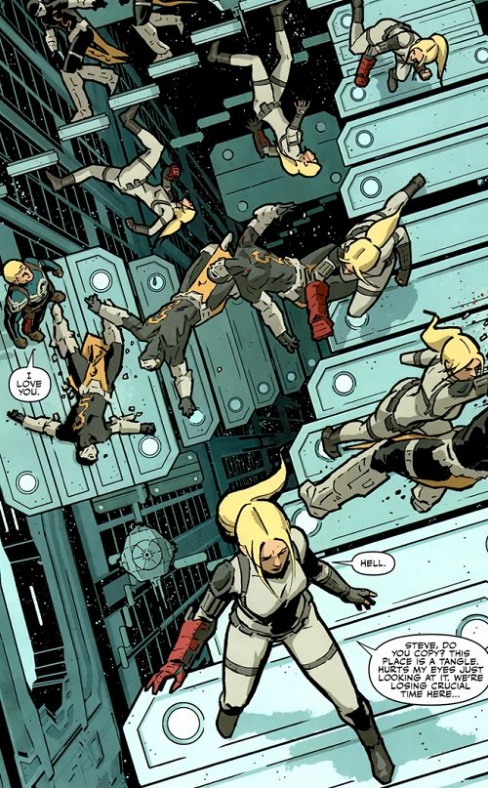I like Avengers comics. I like Warren Ellis comics. But I like them for completely different reasons. When these two good things are combined, do they mesh perfectly like chocolate and peanut butter? Or do they create a grotesque monstrosity of two good things that don’t belong together (like sushi-flavored Oreos).
Beginning in 2011, Warren Ellis wrote six issues of “Secret Avengers” (volume one, #16-21). Each issue was drawn by a different artist and contained a standalone story. Free from needing to worry about character arcs, continuing plot threads, or multi-issue narrative structures, Ellis served up six strong shots of his distinct blend of violence, science, and twisted creative vision. These issues are as bleak as they are rich with fascinating concepts.
In an interview with Albert Ching on Newsarama, Ellis commented on his one-shot approach to the book, “I dunno if it’s the right approach, but it’s the one I’m using. It should contrast the book nicely with the other Avengers books.” I certainly have never read an Avengers book that’s anything like Ellis’s “Secret Avengers.” These comics are devoid of warm, hopeful emotions. The good guys always technically win at the end of each issue. But the victories always occur after a high enough volume of trauma so as to ensure that no sense of satisfaction is possible. The only bit of joy that creeps through is in the form of wonderful Marvel continuity gems like Doctor Doom’s time machine, the Satan Claw, and references to The Secret Empire. By the way, that Newsarama interview is worth a read. Ellis openly complains about how endless it is and compares Jamie McKelvie to herpes.
Speaking of artists, I could easily fill this article with a thousand words of praise for the visuals in each issue. Instead, I’ll try to constrain myself to only a few glowing words of endorsement for each.

In #16, Jamie McKelvie’s linework is precise to the point that every panel feels almost shockingly impactful. Matt Wilson’s colors amplify this powerful clarity. Their cohesion as an art team is evidenced by the remarkable fact that the most striking two pages in the issue (and maybe in Ellis’s entire run) are a mostly grey and beige spread of an abandoned city.

Kev Walker’s art in #17 is violent. I don’t mean that it just depicts violence (it certainly does). I mean that there is a violence to its nature that meshes masterfully with the story. Frank Martin soaks the pages in nauseous greys and caustic reds that make you feel the mission’s gloom, panic, and desperation.

The team of David Aja and Raul Allen make “Secret Avengers” #18 look like an incredible video game that I now desperately want to play. Aja draws surgically precise kung fu action in a broken pocket dimension where the physics are haywire. It’s so deeply cool.

“Secret Avengers” #19 has the biggest art team of these Ellis issues with Michael Lark on breakdowns, Stefano Gaudiano with Brian Thies on finishes, and colors by Jose Villarrubia. The fruit of these four artists’ collaboration feels like a James Bond story as H. P. Lovecraft might write it.

Issue #20 is primarily a Black Widow story. The plot is unconventional and moves between sprints, lulls and jolts in a way that is entertainingly difficult to digest. The challenging script is interpreted and elevated expertly by Alex Maleev and Nick Filardi. There are things done in this issue that I’ve never seen another art team attempt.

The final issue in Ellis’s brief run has pencils by Stuart Immonen, inks by Wade Von Grawbadger, and colors by Chris Sotomayor. These pages display a gummy bright pop that contrasts interestingly with their depiction of horrific mutated creations and spy-story bleakness.
The biggest weakness of these issues is how Captain America is characterized. I’m not usually one to get precious about how different writers approach the same character, but I am completely taken out of the story when I see Steve Rogers coldly telling Beast to get over killing hundreds of men or encouraging torture to extract information. Steve Rogers’s purity of conviction in the face of a cruel world is what makes him cool. Not the cold detachment that make so many Ellis protagonists cool.
In contrast, Ellis seems to have a fantastic grasp of the other characters in the book. His Moon Knight has a dark wit and an appetite for violence. Beast is wonderfully portrayed as a genius in love with the sound of his own voice. His Black Window is deadly, methodical, and possessed of an indomitable force of will.
Does Ellis’s “Secret Avengers” work as a massively cool action comic? Absolutely. Does it work as an Avengers comic? Not really. These are Avengers comics in name only. But that hasn’t stopped me from returning to these issues over and over again.






